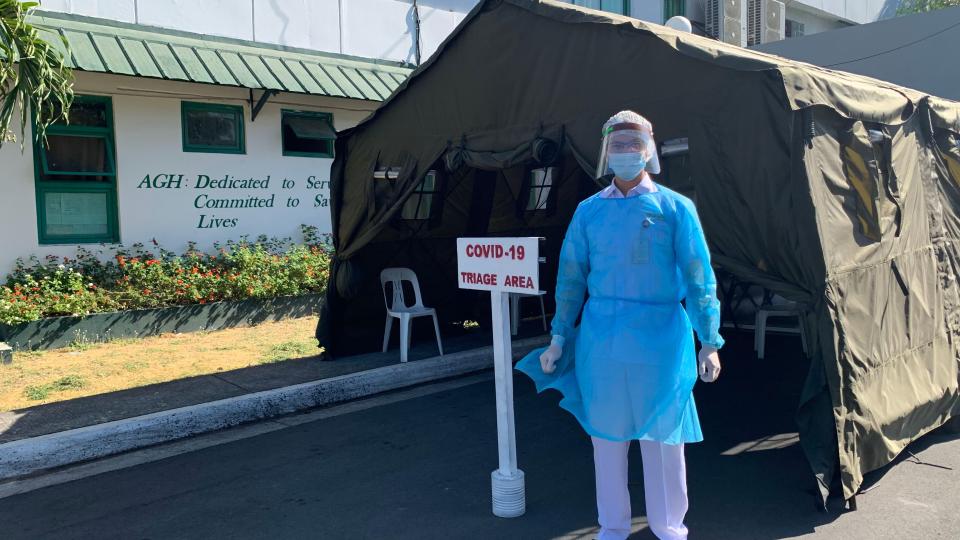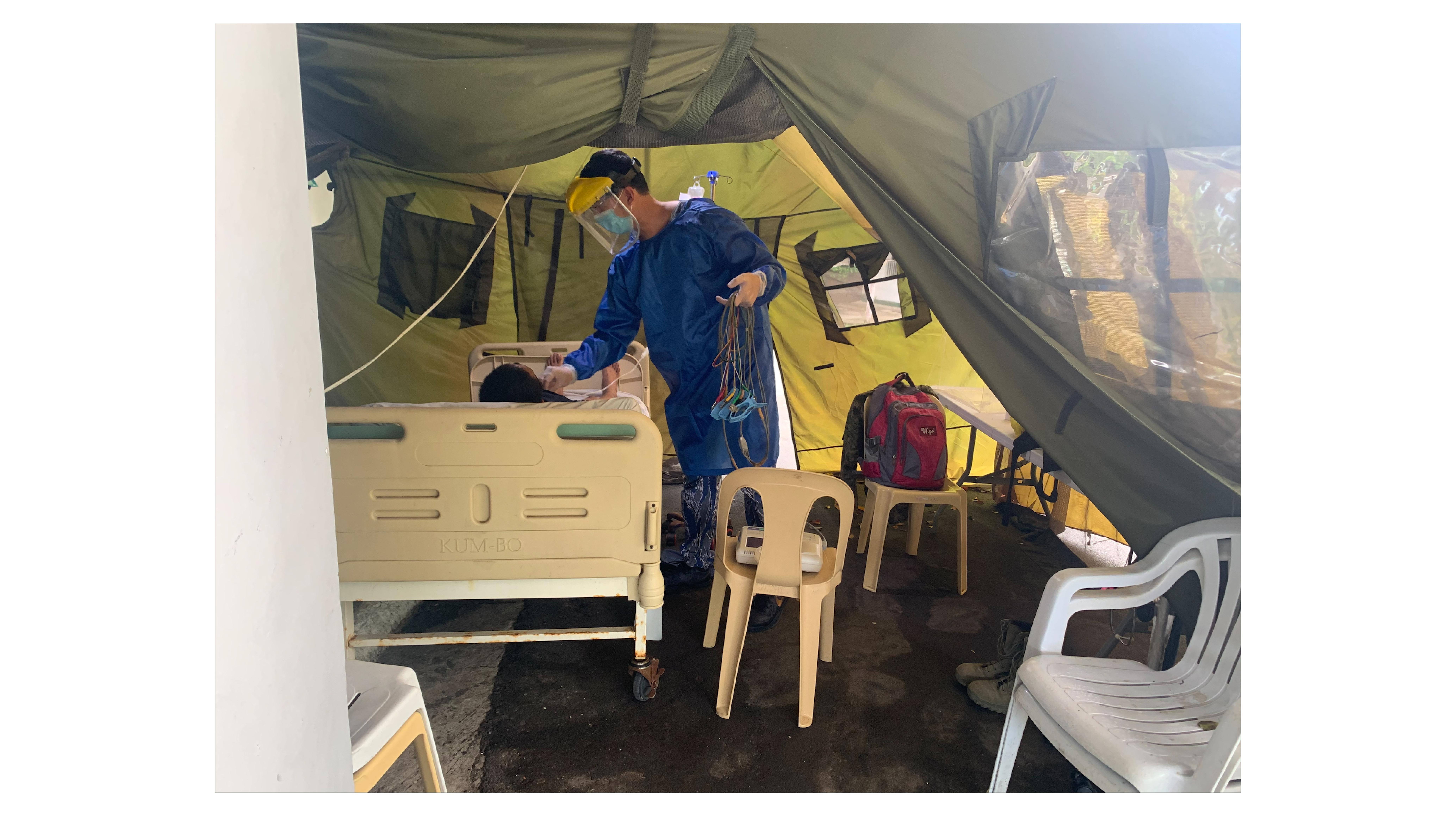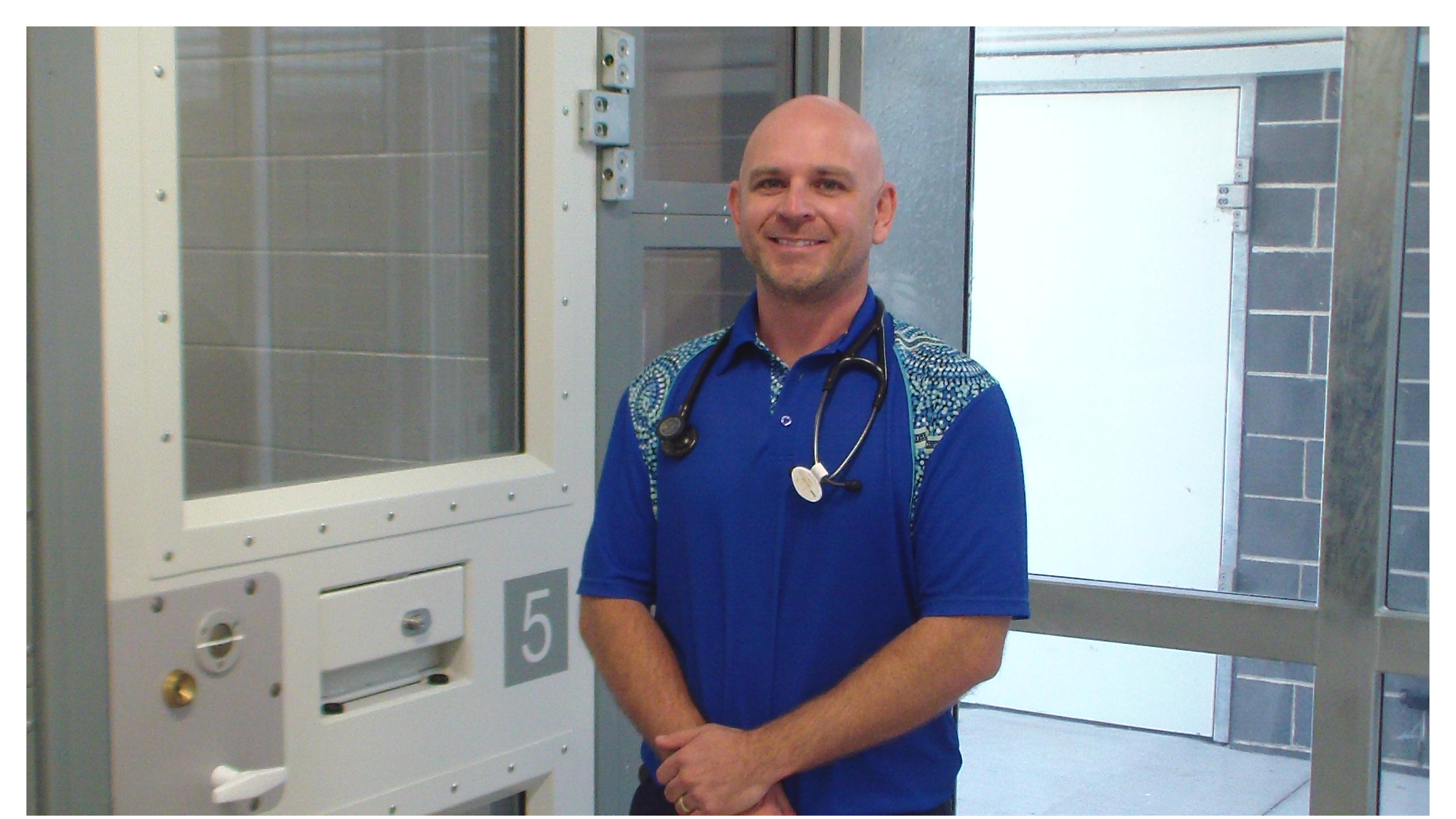Enfermeras que cambian vidas en sus comunidades
Nurses can often be a person’s first, or sometimes only, healthcare contact. But Covid-19 made the job of nursing much harder. How did they continue to help vulnerable patients while responding to a public health crisis?
In an emergency, nurses must be ready to take charge and spring into action.
"Recuerdo perfectamente una noche en Charleston, Carolina del Sur, hace unos años, cuando recibí una llamada diciendo que se había ido la luz en nuestro hospital principal."
The backup generator had kicked in and then failed, so some essential systems were offline – telephones had stopped working along with elevators and power for essential equipment like ventilators. Patients, including babies on the neonatal ward, who needed breathing assistance had to be ventilated manually or moved to another part of the hospital that had power.
“It was a true disaster situation,” says Cipriano, who had to think on her feet. The nurses ran extension cords from areas that had power to the patients, or moved them to other parts of the hospital. At that moment she thought “what do we need to do to keep everyone safe? How do we [plan for] what's going to happen in the next 15 minutes, 30 minutes, 60 minutes?”
While unusual, this sort of event wasn’t unheard of in Charleston – Cipriano experienced four hurricanes in her time there. “Many nurses there who had lived through Hurricane Hugo in 1989, which at the time was one of the most powerful hurricanes to hit the southeast United States, and who had to rescue babies when windows in the neonatal intensive care unit were blown out by deadly winds, actually suffered from post traumatic stress disorder for years afterwards,” she says. “I mean, it would trigger severe stress for anyone if they had worked through that event.” When anticipating a storm, staff would be asked to arrive at work with three days’ personal supply of water and fresh clothes, should they be locked down in the hospital. The constant pressure was telling.
Coping with crises is part of the job for every nurse. When Covid-19 emerged, while it presented new challenges, the mentality of being adaptable and resourceful was already there, says Cipriano. From emergency rooms to rural communities nurses continued to serve their patients through the uncertainty and without a full understanding of the transmission of Sars-CoV-2.

Ir más lejos
Danilo C Pamonag Jr es enfermero de urgencias en el Hospital General del Ejército de Filipinas desde hace más de cinco años. Aún recuerda vívidamente el comienzo de la pandemia en enero de 2020. "Teníamos escasez de equipos de protección individual (EPI), especialmente mascarillas", dice. La falta de EPP era un gran problema en este bullicioso hospital, y para Filipinas en general. Al principio, Pamonag tuvo que tirar de ingenio y utilizar mascarillas caseras hechas con esponjas cortadas y sujetas con elástico, que aunque no eran ideales, eran mejor que no tener protección.
But Pamonag knew that more could be done and was determined to do his part. He donated some of his salary and spearheaded fundraising to help other local hospitals who had an insufficient supply of PPEs. He distributed PPEs to seven different hospitals, including the Lung Center of the Philippines, which was in dire need at that time.
Now, he says the pandemic is easing and there is a return to a more normal working pattern, but the can-do mentality that he and his colleagues showed has stayed with them. While his personal contribution has drawn plaudits, he smiles at the suggestion he is deserving of them and praises his colleagues actions too.

While Pamonag says he was motivated by teamwork, sometimes individual nurses can have a big impact on their communities.
Patience Shipalane is a community nurse in George, a municipality in Western Cape, South Africa. Her day-to-day involves visiting creches, schools, workplaces, universities and homes to educate people in basic hygiene and health. Diarrhoea, for example, spreads quickly through these communities and vitamin A and D deficiencies are common. In George, these can be life-threatening.
In informal settlements people share taps and toilets, and might handle food from street sellers without washing their hands, so an infectious disease can spread rapidly through the population. “Imagine the queue, how it's going to be while everybody's rushing for the toilet,” says Shipalane.
Her community is affected by poverty, crime, poor quality of life and other social challenges such as child neglect. While visiting homes, Shipalane is also able to look out for signs of neglect. “And once we see that, we involve the environmental health practitioners, audiologists, speech therapists, even the South African Police Services – we are not working alone,” she says. Nurses rarely take credit for the talents they bring to connect their keen observations with acquiring and coordinating services to meet the needs of people.
Shipalane takes it upon herself to personally book appointments for children, calling parents, and following up with them at home. She has touched so many lives that she is often approached for advice by people she doesn’t recognise.
“They feel comfortable because I understand them, even if they don't understand English. I've got the ear, you know.” Shipalane speaks Xitsonga as her original language from the Limpopo Province, and other local languages like, Isixhosa, isiZulu and Afrikaans. Because they know she is approachable, locals sometimes report suspicions of neglect.
“They tell me ‘You must go to that house, we don't think that those children go to the clinic’,” says Shipalane. “If somebody thinks that there is a problem, I won't let [them] down. I go straight to where they are telling me that there is a problem.”
But her help is not always accepted and sometimes can result in confrontations. Shipalane gives one example of a mother who was “a little bit aggressive”. Likewise, Pamong says that patients in the emergency department can also be intimidating. “It really takes a lot of patience, because some of our patients can be irate because they don't feel well,” he says. “So we have to calm ourselves even though they are angry at us.”
Shipalane says she doesn’t worry about hostility, all she cares about is the child. In the particular case she mentioned “there was a need, because that house was a small, small, small informal house. You could see the [lack of] hygiene.” But she was able to earn their trust through persistence.
“When I wake up, I say I just want to make a difference to one child in the community,” she says.
A foundation of trust
Cipriano says she often sees that nurses feel compelled to help people from their own personal resources when they feel like someone has been let down elsewhere, adding that it is not in the job description. “It may not sound like a big challenge, but it truly is because there's not only emotional investment, but intellectual investment,” she says. Nurses are inherent problem solvers however sometimes the magnitude of social and economic issues exceeds what a nurse can do to help.
That emotional investment comes from building up a rapport with a patient, adds Cipriano. And rapport can be built in unusual ways. Richard Newman is a nurse practitioner, providing health services to those in the criminal justice system in Australia. The criminal justice population is very vulnerable, with limited access to healthcare and sometimes very low levels of health literacy, so Newman has learnt to listen deeply to his patients – a practice known as dadirri to First Nation people.

"Algunos de mis pacientes tienen comorbilidades múltiples y muy complejas", dice Newman. "Así que paso tiempo sentado con ellos, analizando y elaborando la progresión de la enfermedad, y quizá coordinando la atención con varios especialistas".
A veces, Newman descubre enfermedades que sus pacientes desconocían. Pero explicarles su estado puede ser un reto, ya que puede ser su primer contacto con la atención sanitaria oficial. Pone como ejemplo reciente el caso de un recluso que había estado tirando la medicación a escondidas porque pensaba que podía tratar su enfermedad sin intervención médica. Esto sólo salió a la luz después de que Newman escuchara atentamente la creencia del recluso de que podía vencer su enfermedad por sí mismo.
"Muchos pacientes desconfían del gobierno por traumas intergeneracionales de larga duración", dice Newman, explicando por qué algunos presos pueden ser reacios a tratar con él. "También es posible que hayan sido defraudados por quienes dicen querer ayudar. Hoy mismo hablaba con [mis colegas] del valor de la credibilidad y de lo fácil que es perderla y lo difícil que es ganarla. Y en nuestro entorno, una de las cosas más importantes es la credibilidad ante nuestros pacientes, establecer una buena relación y generar confianza".
Newman pone el ejemplo de hacer promesas realistas a los pacientes. En el entorno penitenciario, las citas y los tratamientos pueden cambiar en función de lo que ocurra en la cárcel. La seguridad es, con razón, la máxima prioridad, dice, pero eso significa que puede verse obligado a cancelar citas cuando se cierran bloques de celdas o prisiones enteras. "Si un preso está encerrado, tengo que decidir si su estado es lo suficientemente importante como para tener que verle o si puede esperar". Esos cierres impredecibles se complicaron durante la pandemia por las normas de cuarentena, ya que los presos tenían que aislarse si entraban o salían de los edificios.
Newman afirma que el entorno penitenciario está bien preparado para controlar la propagación de enfermedades infecciosas -ya que no son infrecuentes los brotes de virus como el norovirus-, pero no siempre es propicio para atender rápidamente a los pacientes.
Afrontar los retos
La seguridad de las enfermeras en todos los entornos es primordial, añade Cipriano, que aborda los retos que aún quedan por delante para mejorar las condiciones de trabajo de las enfermeras. "Y eso incluye todo, desde una dotación de personal adecuada, que es una base realmente crítica, hasta una remuneración adecuada, asegurándonos de que estamos abordando cualquier tipo de estrés emocional, salud mental y manteniéndolas seguras desde el punto de vista de no tener ningún tipo de violencia en el lugar de trabajo".
"Nos preocupa mucho que ya haya un déficit previsto de unos 6 millones de enfermeras, que podría aumentar a 13 millones en los próximos ocho años", afirma. "Sabemos que muchas enfermeras se han retirado temporalmente -y esperamos que no permanentemente- por el estrés de la pandemia y otros efectos. Tenemos que reconocer que corremos el riesgo de perder gran parte de la sabiduría que hay en nuestra plantilla".
Aunque ahora hay algo más de enfermeros como Pamonag y Newman, siguen siendo una minoría. Cipriano afirma que la igualdad de género será esencial para retener a los enfermeros, ya que las mujeres representan en torno al 80-90% de la mano de obra en algunos países, pero están insuficientemente representadas en los puestos directivos.
Pero confía en poder resolver este problema y se muestra optimista respecto a que las enfermeras que tenemos seguirán prestando unos cuidados excelentes. "Las enfermeras no sólo son muy inteligentes, hábiles, flexibles e ingeniosas, sino también increíblemente amables, generosas y compasivas, y no se dejan intimidar por hacer lo correcto", afirma. "Y eso se manifiesta realmente no sólo por el trabajo que tienen, sino por su dedicación a las personas a las que atienden".
Durante la pandemia, esta resistente profesión se vio sobrecargada e infravalorada. No era la primera vez que se pedía a los enfermeros que fueran más allá de su deber. Cipriano afirma que gracias a su dedicación y compromiso con sus pacientes, como atestiguan estas historias en situaciones a menudo muy difíciles, las enfermeras se han ganado el respeto de todos nosotros.